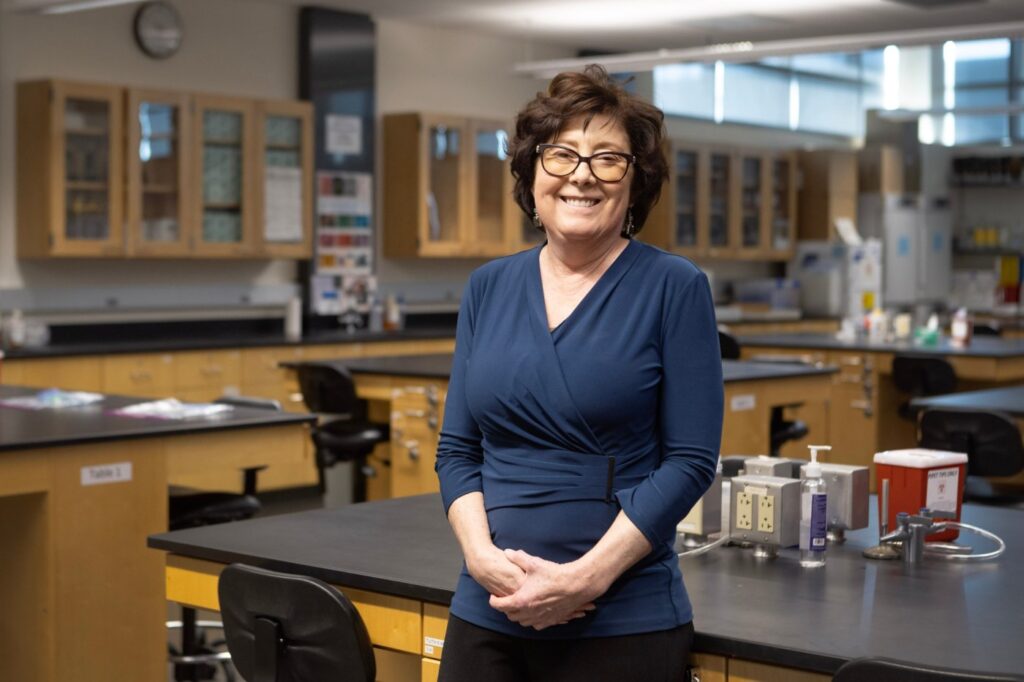
By Larry Urish, contributing writer
As a long-time professor of biology at Santiago Canyon College, Denise Foley has spent years working in a microscopic world. It’s been a passion of hers long before she started teaching at SCC in 2006.
However, it’s in the macro world, a world inhabited by people we see and influence, where Foley has followed another, more far-reaching passion.
“I just love teaching,” Foley said. “As a senior undergrad teaching assistant, I was in charge of a lab section in a freshman lab course, but I really was the instructor. It was fun. I knew I’d be going into teaching.”
Along with microbiology lecture and lab coursework, Foley developed SCC’s microbiology program. She concurrently served as the biotechnology program coordinator while co-chairing the Biology Department.
“I like helping students understand things,” Foley said. “It’s motivating to know this role involves helping students to achieve their goals.”
The higher-ups at SCC noticed, honoring Foley with the college’s Full-Time Faculty Excellence Award in 2014.
From a broader perspective, her involvement in so many SCC efforts that empower students to learn and transition into the world of work makes her uniquely qualified for her new position: acting dean of the college’s Business and Career Education Division, which she began in February.
Along with having served as supervisor of all the supplemental instructor leaders who work with SCC biology courses, Foley is on the Education and Master Planning Task Force; was on SCC’s Accreditation Team during the last round of the accreditation process; and for two years served as a member of the college’s Speaker Symposium Committee.
But it is her key contributions in incorporating the precepts of a program known as Guided Pathways — and ensuring that these precepts be adopted, stressed and expanded at SCC — that most closely aligns with Foley’s commitment to students.
Utilized by the California Community Colleges system, Guided Pathways is designed to help students move toward their goals by establishing clear direction and reducing barriers to success.
Foley, a longtime professor of biology, first started teaching at SCC in 2006. (Photo by Drew A. Kelley, contributing photographer)
It’s composed of four “pillars,” Foley said: (1) Clarify the path – faculty make clear what a typical two-year course schedule will entail; (2) Enter the path – assistance with the application and onboarding process; (3) Stay on the path – all manner of academic and personal assistance; and (4) Ensure learning – making the classroom experience the best it can be.
“Declaring a major isn’t good enough anymore,” said Foley, who for six years worked as the faculty facilitator to help push forward Guided Pathways’ concepts to SCC. “Even just 10 years ago, an academic department offered a major, but nobody thought beyond that. Once you finish your degree, what does that lead to?”
She stressed that students should know walking in what’s available when they walk out. “We’re asking all programs to implement Guided Pathways. It’s a work in progress.”
Under Foley’s leadership as acting dean of the Business and Career Education Division, Guided Pathways’ four pillars will surely be incorporated to greater degrees at SCC, including the college’s Career and Technical Education Division. CTE provides the academic, career-planning and support-services framework for programs that lead to careers in everything from accounting and business to code enforcement and water and wastewater technology.
Another CTE area of study, biotechnology, blends Foley’s fascination with microbiology and her passion for helping ensure student success. For more than a decade, she’s been a key player at OC Biotech Education, a collaboration between SCC, Irvine Valley College, Fullerton College and Santa Ana College. The program opens doors to a vast assortment of careers in biotechnology.
“There are a lot of different jobs in biotech,” Foley said. “Some don’t require a bachelor’s degree; they require specialized skills. Others need higher degrees. It runs the whole gamut.”
The collaborative nature of OC Biotech greatly aids biotech students. “It’s helpful on different levels,” said Foley, who helped found the program and spearheaded its involvement with SCC in 2013. “Faculty can share best practices. And a student who needs one of the classes, but SCC isn’t offering it that semester, may be able to take it at, say, Irvine Valley College.”
One beneficiary of OC Biotech is Michael Chapman, project manager, project development for medical device manufacturing at Pro-Dex, Inc., an Irvine-based firm that designs and produces medical devices for the health care industry.
“Dr. Foley (along with professor Anson Lui; the two constituted ‘my academic mom and dad’) guided and mentored me, always stressing the industry standards required to succeed in biotech. These standards going forward aided my transition into the industry.
“Her goals and efforts were all geared toward my success,” Chapman continued. “So, if I succeeded, she succeeded.”
If Foley can provide just one nugget of advice, it’s this: “Work hard but smart.” It’s embodied in so much of what she’s been involved with in the macro world: award-winning teaching, Guided Pathways, CTE, OC Biotech and much, much more.
Related Articles
If schools won’t ban kids’ cellphones, some lawmakers say, they will
Alum is one of 7 siblings to attend Santiago Canyon College
Researcher analyzes data to help decision-makers meet students’ needs
A match made in medicine, UCI students discover where they will continue their career
Former ‘first lady’ of Cal State Fullerton honored
